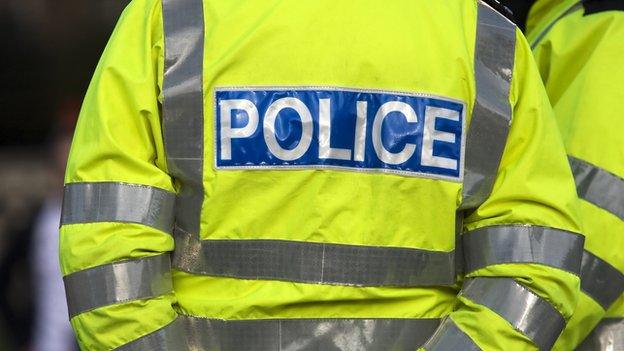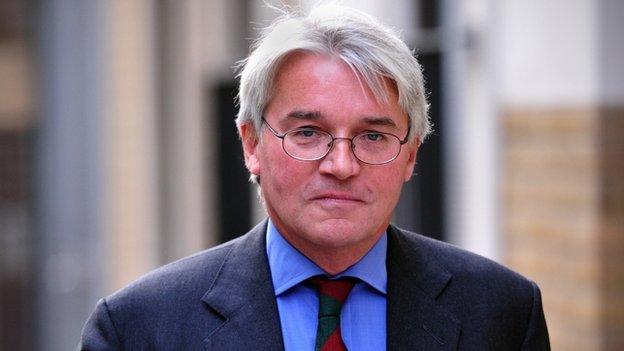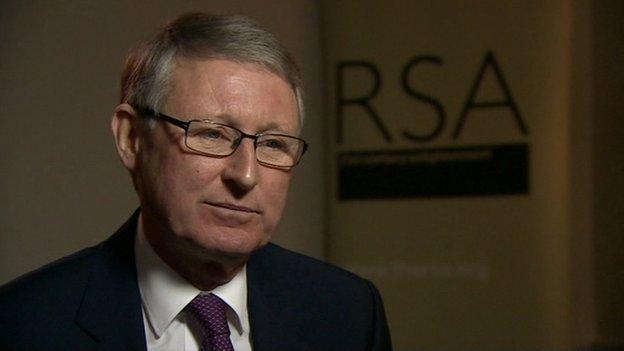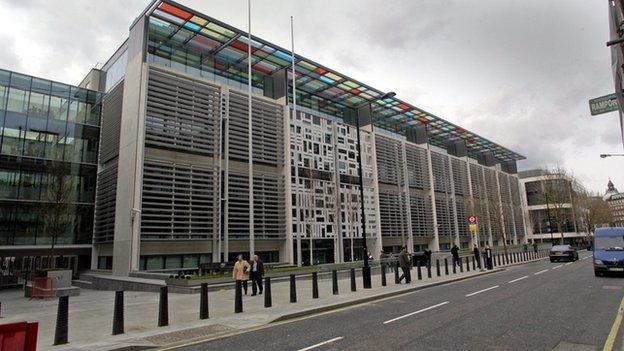Police slow to adopt May's demands
- Published

It is a speech I won't forget.
On 21 May last year, Theresa May delivered an electrifying address to the Police Federation of England and Wales at its annual conference in Bournemouth.
Reform yourselves or I'll impose reform on you - the home secretary's message to the 96-year-old federation couldn't have been clearer.
Later that day, with a gun effectively held to their heads, federation members agreed to implement all 36 recommendations made by an independent panel, chaired by the former Home Office permanent secretary Sir David Normington.
The Normington review, published three months earlier, painted a picture of a dysfunctional organisation that had lost the trust of its 125,000 members.
Sir David said there was evidence of "bad behaviour" within the organisation's headquarters in Surrey, and at its 43 branch offices.
Home secretary Theresa May: "Show the public you get it"
The six-member review panel was particularly critical of a series of personal attacks launched by federation members on public figures, such as Andrew Mitchell, the former government chief whip, describing the approach as "wrong-headed".
The review called for fundamental changes to the way the Police Federation was structured, governed - and financed.
It suggested that because the federation was well off, with reserves and assets totalling more than £64m, subscription fees should be cut by a quarter.
It also wanted to open up for scrutiny about 30 secretive bank accounts held by branches - the panel had been refused access to all of the accounts, which held an estimated £30m.
So, 12 months on from those tumultuous events at Bournemouth, as federation members gather for this year's conference at the seaside, is it a changed organisation?

The Police Federation was criticised for its handling of the Andrew Mitchell "plebgate" case
There has certainly been less controversy, no public squabbles with the government, no internal scandals.
The most high-profile event of the year, the libel case involving Mr Mitchell, ended with victory for federation member PC Toby Rowland, after a judge ruled that the Conservative MP probably had accused officers of being "plebs" during a row at the gates of Downing Street in 2012.
Meanwhile, federation branches have been conducting a steady campaign against Home Office spending cuts, #cutshaveconsequences, without the rancour that characterised some of their previous lobbying.
There have been some important legal changes to the federation as well - measures promised by Theresa May during her barnstorming speech.
The presumption that police recruits would automatically become members of the organisation has changed
They are now required to opt in to join and pay the subscription fees, rather than having to opt out.
Although since the measure came into effect in April, 100% of officers have decided to sign up.
But in terms of implementing the Normington changes, progress has been painfully slow.
Of the 36 proposals, only six have been fully introduced:
a new "core purpose" for the federation
a commitment to openness
public-value reports
equality assessments
support networks
a change programme team

Sir David Normington suggested a package of changes
A number of other proposals are close to being finalised, including:
the opening up of bank accounts detailing federation funds
establishing membership databases
guidance on the publication of committee papers
However, there has been no reduction in the subscription fee, while recommendations to increase the "professionalism" of the federation's head office appear to have stalled, with the appointment of a director of equality and diversity still some way off.
"There's lots of unease about the term 'director'," says Andy Fittes, the federation's general secretary, who acknowledges that "there are people within the organisation who are less keen than others" on the overall change programme.

Police Federation regions:
North West: Cheshire, Cumbria, Greater Manchester, Lancashire, Merseyside
North East: Cleveland, Durham, Humberside, Northumbria, North Yorkshire, South Yorkshire, West Yorkshire
Midlands: Staffordshire, Warwickshire, West Mercia, West Midlands
Eastern: Cambridgeshire, Derbyshire, Leicestershire, Lincolnshire, Norfolk, Northamptonshire, Nottinghamshire, Suffolk
South East: Bedfordshire, Essex, Hampshire, Hertfordshire, Kent, Surrey, Sussex, Thames Valley
South West: Avon & Somerset, Devon & Cornwall, Dorset, Gloucestershire, Wiltshire
Wales: Dyfed Powys, Gwent, North Wales, South Wales
London: City of London, Metropolitan

The most complex area of change - and arguably the most significant - involves the way federation decisions are made and representatives elected.
The review called for:
the abolition of committees for each police rank - constable, sergeant and inspector
new, slimmed-down bodies to make local and national decisions
greater voting rights for members to determine who leads them
Red-tape problem
But the proposals require action from the Home Office, because the federation's constitution is embedded in statute, the Police Federation Regulations 1969, external.

The Home Office is responsible for Police Federation regulation
Until the regulations are changed, via statutory instruments that require parliamentary scrutiny, the federation's structure and governance cannot be changed.
"We're not a body that has our own destiny in our own hands," says Sgt Fittes.
"There seems no desire in government to release us from regulation."
Ministers and officials underestimated the difficulties in amending the regulations, he says - "they didn't understand the scope of it" - and he suggests bureaucracy is also playing a part.
"Government is not a racing machine - it's a tractor that plods along at its own pace," says Sgt Fittes.
The Home Office points to the changes it's already made, among them the power to "call in" federation accounts at any time.
It has also set out a draft clause about making the Police Federation subject to requests under the Freedom of Information Act and intends to make the other regulatory amendments to tie in with the federation's own internal changes.
Momentum needed
Anthony Painter, who led the secretariat to the independent review team, says momentum must be maintained to ensure the proposals they put forward come into force.
"It's a work in progress," he says. "A lot of the reforms have big organisational consequences, so it will absolutely require considerable vigour in implementing them."
When any major change is required, there is always a danger that opponents can exploit delays to prevent it.
But Mr Painter doesn't believe that will be possible with the Police Federation continually under the spotlight.
"There's no way there can be any backtracking without it being done publicly," he says.
"But if they start to backtrack on the changes to the rank divisions, for example, that's when we'd start to get concerned."
Sgt Fittes is hopeful that the regulation changes can be completed by the end of the year, with 80% of the reforms in place by the time of the 2016 annual conference.
Theresa May's warning - reform or be reformed - still rings in his ears.
"If we turned round and said, 'It's all got a bit difficult,' there's no way they'd say, 'We won't bother.'
"They're not going to let it go."